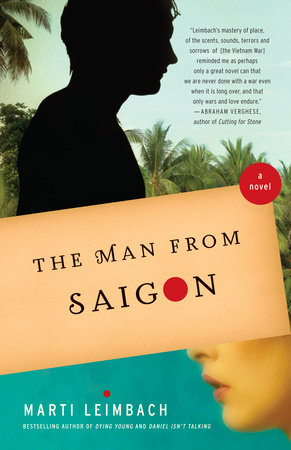Reading Group Center
- Home •
- Books by Category •
- Imprints •
- News •
- Videos •
- Media Center •
- Reading Group Center
The Man From Saigon
By Marti Leimbach
1. Susan’s editor insists that the Vietnam assignment is a plum job—a chance to “distinguish yourself . . . to be somebody.” Is this why Susan says yes, or are other factors at play? If you had been in her position in 1967, would you have accepted the assignment?
2. What qualities do Marc and Son share? How do they approach the idea of allegiance and justice differently? Which man loves Susan more completely?
3. Why do you think Susan teams up with Son? What might she gain from their alliance? What advantage might Son see in working with Susan?
4. Did you trust Son? How did your impressions of him shift throughout the novel?
5. What is at the heart of Marc and Susan’s devotion to each other? Which of them proves to be stronger—emotionally and physically—while coping with the deprivations of being in country?
6. What fears do Susan and her captors (Anh, Minh, and Hien) have in common? What enables her to gradually gain their trust, protecting herself along the way? How does she challenge everything they have previously believed about women? Is their view of women very different from that of the U.S. soldiers she encounters?
7. Minh assures Susan that one day she will become a wife. Is he right to pity her for being single, or is it a sign of strength that she is unmarried when she travels to Vietnam, while Son and Marc have spouses?
8. Discuss Christine’s arrival. What does her presence reveal about Marc’s mind-set before he left for Vietnam? Why is she willing to take such a risk to bring him home safely? Could she be considered loyal?
9. How are identities formed in The Man from Saigon? What does it mean to Susan to carry a British passport? How does Marc reconcile his role as an American with the fact that his government is misleading the public? How does Son define the true Vietnamese identity? Why does he resist feeling sympathy for the Montagnards?
10. Discuss the different types of love that flourish in the novel. Which type of love proves to be the most resilient, and which the most self-sacrificing?
11. Though Susan is in a role traditionally dominated by men, she faces challenges that all members of the media endured when they tried to reveal the truth about Vietnam. Despite the military’s frequent insistence that female journalists had no business being in their path, were women in fact better equipped to meet the challenges of the job?
12. How did you interpret Son’s final note? Is it purely a generous gift for Susan, saving her from the looming Tet Offensive? How realistic is Son’s fantasy of one day marrying Susan? Had the war had a different outcome, is it conceivable they would one day marry?
13. Discuss the structure of the novel. As two points of view are presented in alternating passages after Susan’s disappearance, what do we begin to understand about Susan and Marc’s relationship? Do they perceive each other, and their relationship, in the same way?
14. How is Susan transformed by Vietnam? Are she and Marc damaged by their experiences there, or do you read their closing scenes as portraits of clarity?
15. How do previous novels by Marti Leimbach portray the concept of youth and life’s meaning in its early stages? How might her other novels have prepared her to write this one?
(For a complete list of available reading group guides, and to sign up for the Reading Group Center e-newsletter, visit www.readinggroupcenter.com.)


